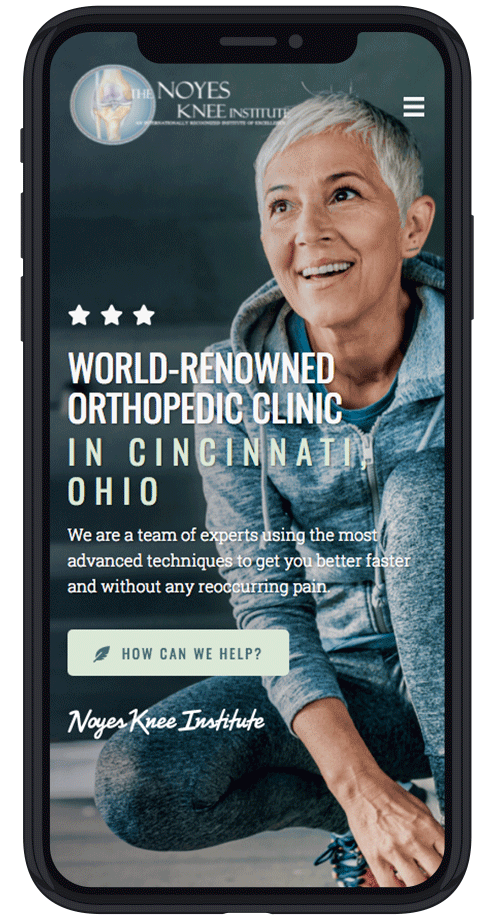Published On
Category
Knee pain can result from overexertion, injury, or medical conditions like arthritis. This pain hinders daily activities like walking, decreasing your overall productivity. At Noyes Knee Institute, we’ll treat your knee pain to improve your quality of life. Here are some red flags that necessitate seeing an orthopedic knee surgeon:
Sudden Severe Pain
Sudden severe pain with no apparent cause can indicate a serious knee injury. This could include a meniscus tear, torn ligament, fractured bone, or a dislocated kneecap. Seek immediate professional help if the sudden severe pin limits your movement or ability to bear weight on the affected knee.
At Noyes Knee Institute, we have decades of experience helping patients with severe knee pain. We’ll identify the root cause of your pain and create a personalized treatment plan to get you back to your active lifestyle.
Buckling of the Knee
Knee buckling may signal instability in the knee joint or a ligament tear. Ligament tears like anterior cruciate ligament (ACL) tears can make the knee unstable. This results in a sensation of the knee giving way during weight-bearing activities.
At Noyes Knee Institute, we’ll ask questions about the buckling sensation and order imaging tests to determine if you have a torn ACL. We have a 95% rehabilitation success rate, having conducted over 5,000 ACL reconstruction surgeries. You’ll be in safe hands if you need ACL reconstruction surgery.
Swelling and Warmth
Swelling and warmth around the knee joint can indicate an inflammatory condition like arthritis or an infection. Inflammation can cause the knee joint to become painful and warm to the touch. Sometimes the swelling may be accompanied by a limited range of motion and joint stiffness.
At Noyes Knee Institute, we’ll determine the root cause of the swelling by conducting a physical examination and ordering blood tests. The examination allows us to determine whether your range of motion has been affected. Blood tests will enable us to identify underlying systemic conditions like infections or rheumatoid arthritis.
Knee Locking
Healthy knees are flexible. You should be able to rotate your knees slightly and bend them up and down. Their flexibility allows you to perform daily living activities like standing and sitting. If you can’t, you may be dealing with a locked knee.
Locked knees fall into two categories: true-locked knee and pseudo-locked knee. You can’t move your knee in any direction with a true-locked knee. A pseudo-locked knee occurs when pain in the knee joint is too severe to move the knee. True-locked knees can occur because of limited blood supply to the knees. Pseudo-locked knees can occur because of a tear in the ligament cushioning the knee joint, knee joint dislocation, or fractures.
At Noyes Knee Institute, we’ll conduct imaging tests like MRIs and CT scans to determine whether you have a true or pseudo-locked knee. Our orthopedic knee surgeon, Dr. Noyes, may recommend surgery to remove the obstruction limiting blood supply in the knee joints if our tests determine that you have a true-locked knee. If you have a pseudo-locked knee, we’ll recommend conservative treatments like activity modification and medication.
Persistent Pain
Persistent knee pain that doesn’t improve with rest, ice, compression, and elevation (RICE) or doctor-prescribed conservative treatments like pain medications can signal a serious underlying condition. Seek professional help if your pain progresses over time to find an effective solution.
At Noyes Knee Institute, we’ll conduct a joint aspiration to understand your condition. This involves removing a fluid sample from the knee joint to determine if there’s an infection, inflammation, or other underlying condition before recommending treatment.
Consistent Knee Pain After Surgery
It’s normal for patients to feel knee pain for a few weeks after surgery. The pain should wear off as your knee heals. Your surgery may have failed if you continue experiencing pain, swelling, and bruising around your knee months after surgery. This calls for revision surgery.
At Noyes Knee Institute, we only use grafts from FDA-approved tissue banks for our surgeries and take patients through an active rehabilitation program after their procedures. This, combined with Dr. Noyes’s expertise in orthopedic surgery, improves your chances of having a successful revision surgery.
Talk to an Orthopedic Knee Surgeon at Noyes Knee Institute
Noyes Knee Institute is one of the leading knee pain treatment centers in America. Our team is led by Dr. Noyes, an orthopedic knee surgeon who has published over 400 studies in world-leading orthopedic journals and won numerous awards for his expertise and dedication to advancing scientific research on knee injury treatments. We’re committed to helping you regain normalcy in your life after your knee injury or illness. Contact us for effective knee pain treatment.

